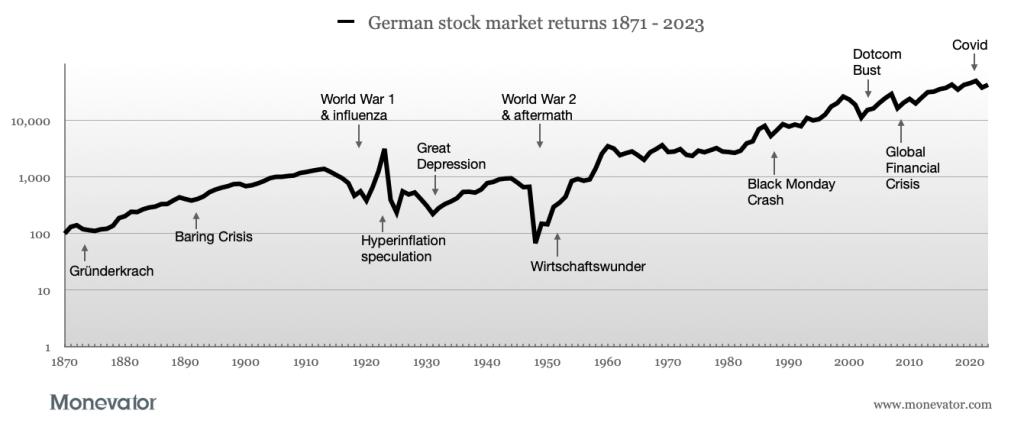
What caught my eye this week.
Turns out Liz Truss really was useless – we don’t even need her to cause chaos in the UK mortgage market.
True, Britain’s Prime Minister for a day achieved in one Mini Budget what it’s taken nine more months of persistent inflation to deliver organically. But two-year swap rates have moved above where they peaked when Truss passed through office last September:
Source: Investing.com
As a result, banks have been hiking mortgage rates again – and even pulling their entire ranges for short periods. My recently secured five-year fix looked toppy in March. But it’s now cheaper than the best rate my bank offers today.
At least we’re not seeing a re-run of the LDI/pensions crisis of last Autumn. Unlike with that politically inspired drama, this time the markets are moving in an orderly fashion to reflect how core inflation is stubbornly sticking around, the Bank of England and the Federal Reserve will likely hike rates further, and that a subsequent slowdown will then see interest rates fall as soon as next year – though remaining at a higher level than was expected just a few weeks ago.
As best I can tell these changing expectations are being transmitted smoothly through the markets. Hence no more surprise blow-ups – at least not so far.
Rather we face all-too predictable pain for UK mortgage borrowers.
I do it for you
Long-time readers will remember I warned we should stress test our borrowing against coming higher rates a year ago.
Well, those higher rates are here and it’s a bit too late to do much about it.
According to the Resolution Foundation, the pain to come for individual borrowers who paid high prices for their homes when they remortgage could be worse than that felt in the 1980s:
The speed of rate rises today means that – for the households that have a mortgage – the income hit from higher rates this year is worse than anything seen in previous decades.
Although Bank Rate isn’t expected to reach the highs of the late 1980s and early 1990s, mortgaged households today are more leveraged than their historic counterparts. That means that, for a typical mortgagor, the rise in rates in 2023 alone is expected to increase repayments by 3 per cent of household income – or around £2,000. This is a bigger annual hit than at any time in almost five decades.
When repayments surged in 1989, as the Bank of England raised rates to nearly 15 per cent, the increase in repayments was only about £1,200 in today’s money for the typical mortgagor, or 2.4 per cent of household income.
The good news – for the government and the economy generally – is many more people now own their homes outright, as the graph in this week’s links below shows. I suspect that swapping out younger buyers for buy-to-let landlords will also limit the extent of the agony this crunch causes, too.
Don’t get me wrong – it could clearly go very Pete Tong, as we used to say in the years following Britain’s last big housing downturn in the early 1990s. I’m just looking for a ray of sunshine here.
Obviously it would help if mortgage rate rises leveled off soon. Their rate of increase on a graph looks like the ‘vert’ of a particularly gnarly skateboard ramp:
Source: Resolution Foundation
As someone who did time in their youth executing face-plants on such ramps trying to pull off a ‘180’, I’m acutely aware of the potential downsides.
The Shoop Shoop song
Naturally, these yield moves have consequences extending far beyond the mortgage market.
Bonds are back in the dumpster, for instance. The day you’ll be happy you own bonds again has been pushed out even further.
On the flipside, that’s good news if you’re a buyer today. You can get positive real yields on UK index-linked gilts again. With a bit of faff, you could protect the spending power of your wealth for decades to come and earn a little more on top by buying a linker ladder – all taking no risk, except for the opportunity cost of course.
More simplistically, annuity offers will get even more attractive. And savings rates on cash will continue to rise.
While I must confess to being a bit wrong-footed by this second coming of spiky interest rates, we shouldn’t be surprised that returning to economic normality has come with turbulence.
My metaphor for the consequences of the stop-start economic disruption of the pandemic and lockdown years was always a juddering machine that vibrates madly when you turn it off and on.
I’ve long had a particular image in mind – the ‘collating’ machine we used at my student newspaper to stitch together our weekly rag.
For a while I was the ‘collater whisperer’. One of only a handful who could get it to run smoothly.
But the process still took loads of misfired staples and mutant newspapers with three front pages stuck together before we got it dialed in.
Dizzy
Real life – stuff – is messy. Expectations in mathematically-inclined minds that you could suspend and then reboot the economy like pressing refresh on an Excel model were always wide of the mark.
As best I can tell, distortions caused by factories going offline and distribution networks getting snarled up produced momentous supply shocks. Concurrently, we saw (understandable at the time) huge infusions of State Aid and a surge in money supply.
Everything then reversing – stuff getting made, more money lying around to spend on that limited supply – ignited inflation. Putin put the boot in with his invasion of Ukraine. And central banks finally moved to try to put out the fire:
Blaming the BOE for high rates and the inflation shock is like berating a plumber who is fixing your boiler.
We’re here because of the pandemic, an excessive monetary response (in hindsight), the supply chain shock, and Ukraine.
We’ll stay here longer in part because Brexit.
— Monevator (@Monevator) June 14, 2023
Some of that inflation now appears to have gotten ‘sticky’. Put prices up in the supermarket by 20% in a year, and people are going to want more money to pay for the shop. The Bank of England was pilloried for urging pay restraint; perhaps it was futile but this was what it feared.
I don’t think we’re in wage spiral territory yet. But we’re possibly in the foothills, with the directions starting to appear on the signposts. And while this is definitely not a UK-only problem, I believe Brexit has made it worse for us, introducing more frictional trading costs and crimping the flow of workers.
For the Blimps who voted for that benighted and benefit-free project, perhaps things won’t feel too bad. They own their own homes. Cash in the bank will pay a lot more. Mortgage rates will remain well below the near-legendary 1990 peak, enabling them to tell the struggling young that they don’t know their born while ignoring the total costs of purchase.
The pension triple-lock continues, too, protecting the elderly from the sharpest end of inflation.
It all seems like another boot in the face for Britons under 45 though.
Any dream will do
Some might say a big housing crash would be great for young people. But I don’t think the UK economy could endure a 30-50% fall in house prices to approach mid-1990s price-to-earnings ratios without suffering a near-depression. Which wouldn’t be anyone’s idea of fun.
Ho hum. Hopefully we’ll muddle through.
Indeed I wish it were otherwise but I’ve a feeling we’re going to be trudging through the aftermath of the pandemic, the lockdowns, ‘Brexit getting done’, and these inflation and rate shocks – and follow-on tax rises – for many years. The finally-proven liar and disgraced Boris Johnson along with gift card experience prime minister Liz Truss appearing like memento mori at annual events such as Remembrance Sunday to – well – remind of us when and where it all went wrong.
But we can only play the cards we’re dealt. There will be opportunities – there already are – both for our professional lives and for our portfolios.
Just don’t expect the powers-that-be to make it easy for you. They haven’t got the money and they’ve run out of wriggle-room.
Have a great weekend.
p.s. Gosh but 1991 was a terrible year for music until Nevermind arrived. Still miss you Kurt.
From Monevator
When is it okay for a passive investor to time the market? [Member post] – Monevator
Investing for 100-year olds – Monevator
From the archive-ator: Why are we surprised when FIRE-ees have second thoughts? – Monevator
News
Note: Some links are Google search results – in PC/desktop view click through to read the article. Try privacy/incognito mode to avoid cookies. Consider subscribing to sites you visit a lot.
UK mortgage turmoil continues as lenders pull products… – Housing Today
…and average two-year fix inches towards 6%… – Guardian
…while Jeremy Hunt ‘privately’ rules out help for mortgage borrowers… – iNews
…probably rightly, given this recap of the unfair [IMHO] ‘help’ mooted – Guardian
US Fed pauses hikes, but sees two coming more before end of 2023 – Reuters
Molten Ventures cuts Revolut valuation by 40% – Vox
UK government extends deadline for state pension top-ups to 2025 – Which
BoE warns against reliance on reinsurers for corporate pension deals [Search result] – FT
UK staff in EU holiday jobs down 70% with Brexit, industry wants help – CityAM
Any housing crash will be slow due to owner-dominated market – Bond Vigilantes via Twitter
Products and services
Savings account providers scramble for Best Buy top spot – This Is Money
Six ways to improve your chances of getting a mortgage – Which
Open a SIPP with Interactive Investor and pay no SIPP fee for six months. Terms apply – Interactive Investor
Victims speak out over the ‘tsunami’ of fraud on WhatsApp and Instagram – Guardian
Loyalty accounts offer big discounts, but it’s at the expense of privacy – This Is Money
Open an account with low-cost platform InvestEngine via our link and get £25 when you invest at least £100 (T&Cs apply. Capital at risk) – InvestEngine
Where to go in July – Which
Homes for sale with grand designs, in pictures – Guardian
Comment and opinion
Investing personality types – Portfolio Charts
Make a ‘clean break’ divorce deal, or risk costly future claims – This Is Money
How returns happen – Fortunes & Frictions
How long can the UK rental crisis last? [Search result] – FT
Toxic frugality and financial independence – Life Outside the Maze
Begging to differ – Humble Dollar
A Hobson’s choice: getting FIREd – Life After The Daily Grind
How to invest if you’re sitting on a big pile of cash – A Wealth of Common Sense
Average TIPS investor lost money over a decade [US but relevant] – Morningstar
You haven’t got enough time – A Teachable Moment
The tribulations of property, buried below an ISA transfer rant – S.L.I.S.
The difference between self-employment and ‘normal’ jobs – Young Money
Podcasts mini-special
A two-part interview with investment writer William Green [Podcast] – B.T.B.S.
Why stocks are good inflation hedges [Podcast] – Morningstar
Interview with Lord Lee, stock picker and the first ISA millionaire [Podcast] – FT
Oblivious Investor Mike Piper [Podcast] – Clipping Chains [h/t Abnormal Returns]
Naughty corner: Active antics
How did a US-GDP weighted index perform? – CFA Institute
Hidden forces – Sapient Capital
The case for investing in recruiter Robert Walters – UK Dividend Stocks
Long-only value investing: size doesn’t matter – Alpha Architect
Can Japanese regulators really force up valuations? – Verdad
Kindle book bargains
A Man for All Markets by Edward O. Thorp – £0.99 on Kindle
The Tetris Effect: The Cold War Battle for the World’s Most Addictive Game by Dan Ackerman – £0.99 on Kindle
Liar’s Poker by Michael Lewis – £0.99 on Kindle
Love, Pain, and Money: The Making of a Billionaire by John Caudwell – £0.99 on Kindle
Environmental factors
UK lagging in the race to decarbonise, says TUC leader – Guardian
Carbon trading: a slow burn for investors [Search result] – FT
Finland’s plan to bury spent nuclear fuel for 100,000 years – BBC
The coolest library on Earth – Hakai
Be pretty mini-special
Lookism on the rampage – Marginal Revolution
Attractive women 16% more likely to secure start-up funding [Search result] – FT
Robot overlord roundup
OpenAI, DeepMind will open up models to UK government – Politico
Four different ways of understanding AI and its risks – Vox
Klarna CEO on how AI will make shopping “more emotional” – Semafor
Off our beat
Compounding optimism – Morgan Housel
Cool, sexy, and stinking of smoke: cigarettes make a comeback on TV – Guardian
The time traveling mistake we make when procrastinating – Behavioural Scientist
How to reform government finances – Klement on Investing
A review of Wes Anderson’s new movie Asteroid City – Vox
Are Tory MPs as deluded as Boris Johnson? It’s a tough act to follow – Marina Hyde
Hundreds of billions in US Covid relief was wasted or stolen – AP News
Correlation found between cosmic rays and future earthquakes – Science Direct
How to create a masterpiece – Uncharted Territories
And finally…
“We wear different masks and hide our reality from everyone, including ourselves. Our assumed identities becomes our whole lives, and we start to believe them – even more than others do.”
– Mo Gawdat, Solve for Happy
Like these links? Subscribe to get them every Friday. Note this article includes affiliate links, such as from Amazon and Interactive Investor.
The post Weekend reading: Now that’s what I call music, 1990-91 appeared first on Monevator.



